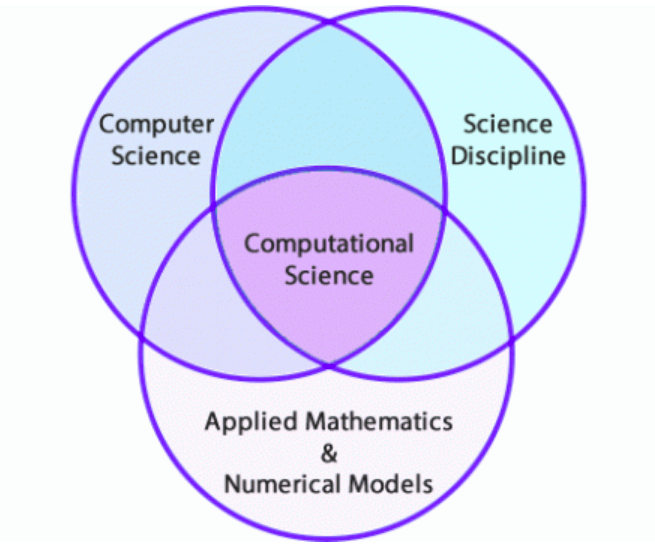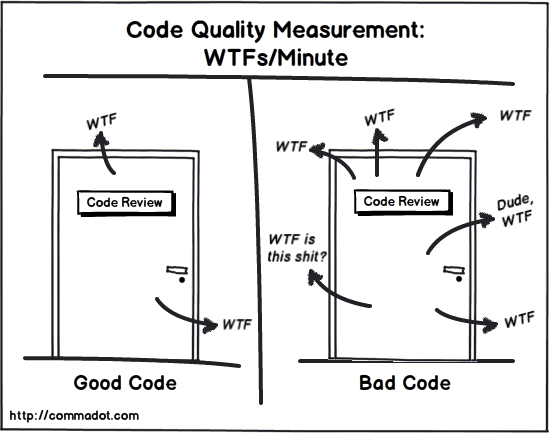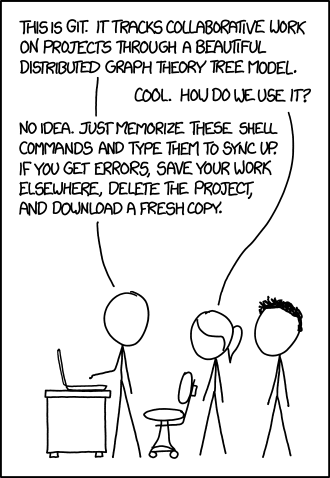How to be a 'good' git evangelist?
Sunniva IndrehusSeptember 02, 2021
Text credit
This text is based on the notes from the community discussion 'How to be a 'good' git evangelist?' which took place during the online Unconference event of the Nordic RSE community on the 29th of June 2021.
The modern scientist's toolbox
Basic usage and skills of computational knowledge are becoming more and more important in academic fields. Both the biologist, physicist, psychologist, and the economist are expected, to some kind of extent, to know how to use and write small scripts to accompany their scientific arguments. To do this in a successful way 'good' scientific software is needed.

A definition of computational science. Figure credit.
'Good' scientific software does not have one clear definition. Dependent on the discipline and field you will get different answers. Some main points that most users/developers of scientific codes would agree upon are that 'good scientific software' is something that is:
- working
- standardized
- understandable
- reproducible
- maintainable

One way to measure code quality. Figure credit.
To help the user/developer accomplish 'good' scientific software there exist several modern tools. Some of these are:
- version control systems (VCS)s
- documentation (in code, Read the Docs, examples, etc.)
- modern editors
- proper debugging tools
- containers
All of them are important in the modern scientist's toolkit but seen from the RSE perspective the deployment and usage of VCSs are often not taken advantage of in scientific domains where coding and software itself is not the deliverable.
This text aims a giving you some techniques or arguments you could use to convince your team that it is time to invest in learning to use version control. We also explore some of the broad tasks that can be more easily accomplished with the usage of modern VCSs and make the daily life of the modern scientist easier.
How can scientists be motivated to learn to use version control?
According to Wikipedia, the first deliberate revision control system was published in 1975. Modern version control is most popularly used for tracking changes in a codebase over time. For this reason, there is also reason to think that this is the only type of task which is relevant to use VCS for.
How can scientists be motivated to learn to use version control?
-
Ability to use advanced regret button. The first introduction to version control on a computer is done by pressing ctrl+z in a gmail or office document. When writing or collaborating on a longer text, the nightmare before version control or having folders with documents like version_final_x_modified_PI_comments.docx, x=[1, 2, ...] quickly becomes a mess.
-
Automatic backups. Remembering to take a backup of your work in progress and keep safe copies is an extremely good idea if your computer crashes, dies, or gets stolen. To complete a typical master thesis in a modern university will contain some kind of scripts used to construct a lot of figures and plots made by changing or commenting in and out some lines of code. If properly explained and introduced, VCSs can be used to track these changes so one never needs to wonder about which configuration that made that figure. You can keep track of changes in a document, for instance, TeX, logging your daily work, and collaborating with your colleagues.
-
Better platform for collaboration. The moment the coding work is shared with colleagues there is a need for a platform for sharing files and scripts. Sending zip-files over mail is not a modern or ideal way of sharing code.
-
The experimental analog: If you were doing a scientific experiment, would you ever trust your instruments if they were not calibrated? To have a successful experiment you will need the right tool for the right job. When touching something data scienceish on a computer, settings for versioning is essential for reproducibility.
-
You will probably need it later to be taken seriously. Most of the students taking a master or PhD today will not stay in Academia. If one decides to join the industry or another part of the real world, academic programmers are not known for good quality on their academic software or scientific code. To be taken seriously as a software engineer or data scientist the use of VCS is a critical tool.
-
A way to track unforeseen consequences. If something is changed somewhere in a code base/script it can have unforeseen effects in other parts of a project. Without VCS it is difficult to know when we have introduced such problems or solutions. In research projects these changes are usually something we need to know since the changes affect our thinking and conclusions which again can/will affect other research projects. It's not good enough to say "well it got fixed at some point. let's just be happy that it is correct now"
-
A way to track unforeseen consequences. If something is changed somewhere in a codebase/script it can have unforeseen effects on other parts of a project. Without VCS it is difficult to know when we have introduced such problems or solutions. In research projects, these changes are usually something we need to know since the changes affect our thinking and conclusions which again can/will affect other research projects. It’s not good enough to say “well, it got fixed at some point. let’s just be happy that it is correct now”.
How can we be 'good' git ambassadors in our communities?
In the days before markdown and sleek web interfaces version control was a tool for the dedicated developer. Today, there exists a broad range of modern graphical user interfaces that simplify the mysteries of branches and merge. Convincing people that the time invested in learning to use these modern tools will pay off is a big part of the RSE job.
How can we be 'good' git ambassadors in our communities?
-
Enforce the use of technical solutions. If someone asks you for help you could provide the solution via GitHub/GitLab/Bitbucket/etc. Embracing one of the nice and modern web interfaces like Github can take away a lot of the complexity for beginners. Remember that you might need to provide some assistance with how to use the platform.
-
Promote workshops. Share workshops like Coderefinery and Software Carpentry with students and colleagues can lower the bar to get people to start using VCSs.
-
Use (positive) social control. Among same or similar level researchers and RSEs it is easier to make suggestions like starting to use git. Even in the fields where the researchers do not develop their own code, but only use software written by others, there is a potential to use VCSs to simplify their daily work. One could use VCS to track the different kinds of experiments conducted when they run code. Changing one parameter, changing to another parameter, etc.
-
VCS helps the reproducibility of research. There are starting to come requirements from journals and conferences on the reproducibility of code used in scientific settings. By enforcing good standards as early as possible one are sure to be good enough when this is actually needed.
-
Convince the authorities. As an individual alone, it can be very hard to convince colleagues to understand why they should invest in learning version control. With the authorities are onboard you can make your life easier. Younger individuals in academia (young post-docs, PhD and master students) are easier to convince than the older generation (permanent staff like researchers and professors).
-
Make it a requirement in research grants. In our modern scientific world, a common task differentiation is to give the programming job and the details to the youngsters let the older generation handle the overall picture and long-term planning. As a result, there is still quite common in academia that people working with code today do not use VCS because their supervisors did not use it in their work and they are not encouraged to invest their time to learn how to use this tool. If the principal investigators for research grants can be convinced to require researchers to work a particular way, it can be very effective to tip the standards in a good direction.
-
Make it a required skill for individuals. Include experience, or the willingness to learn, VCSs a requirement when hiring new people in the group.
When should we learn to use VCS?
From an RSEs perspective version control could easily be introduced right after
the first code line successfully prints hello world, but it is not useless
to learn at any other point.
When should we learn to use VCS?
-
From the beginning. Most students will start their programming career by writing small scripts or completing examples. By introducing VCS at the same time the complexity of the usage can grow with the learner's needs.
-
Wait until needed in daily work. It is hard to imagine an effective and successful code collaboration between more than one person without having some rules for contributions etc. Waiting until one sees the need for the tool can also be a good strategy. Maybe not all projects need to use a VCS, but at the point where one starts to collaborate with other people, VCS is extremely useful.
How and who should teach VCS best practices?
There are workflows that are considered as standards and certain forbidden commands one should not use when working with VCSs.
How and who should teach VCS best practices?

Typical git usage in a nutshell? Figure credit.
-
Include VCS in university courses VSC or Git can quite easily be included as a smaller part of a Python course + Git as a part of a scientific software development practice course. Based on experience it is important to make the learners repeat what they have learned in other settings where they can continue to use the tool for their own needs. University courses that have coding exercises could choose to use a collaborative platform where the students can clone repositories and submit answers. The learners would then start to use version control in a setting where it can not be questioned. For students at the PhD-level, there are usually a certain amount of credits that must be taken. By integrating git in the curriculum all students will hear about git at one point.
-
Volunteer learning initiatives. Workshops and courses hosted by organizations like Coderefinery and Software Carpentry are great examples of settings where learners in communities without RSEs or technical competence in VCS could get hands-on experience and start working. If you have the capacity to give a hand, like being a helper, host or instructor, you can
Summary
If you are an RSE preaching git to colleagues you can try to use 'good enough' practices for scientific computing. Remember that every scientist does not need to master all aspects of VCS to make use of it in their daily work.

In the RSE church, it is effective to preach 'good enough' scientific software. Figure credit: Michele Rosenthal.